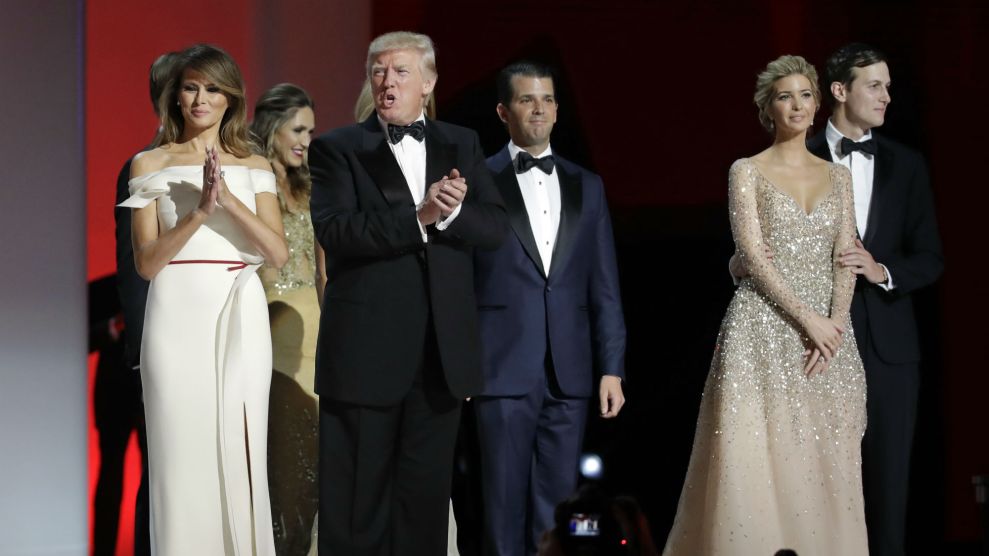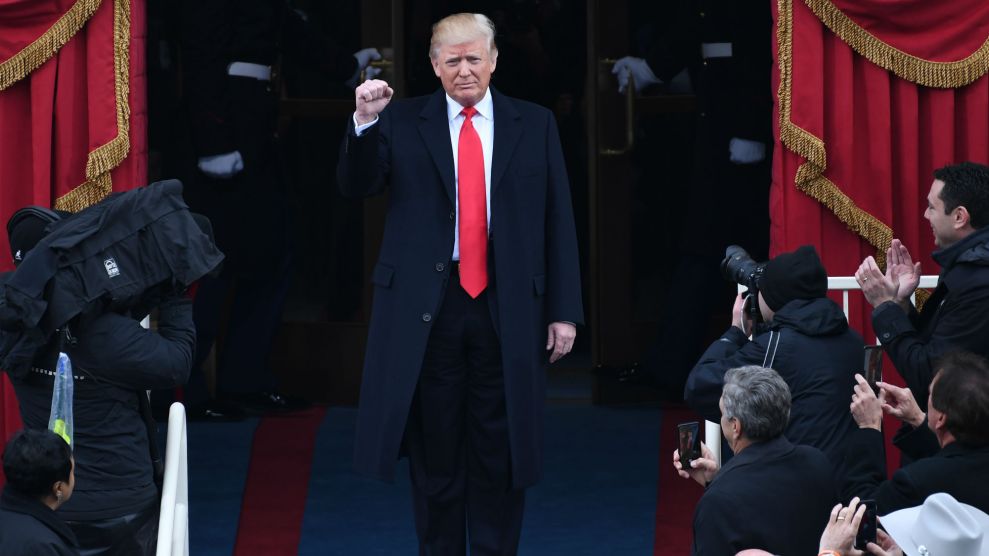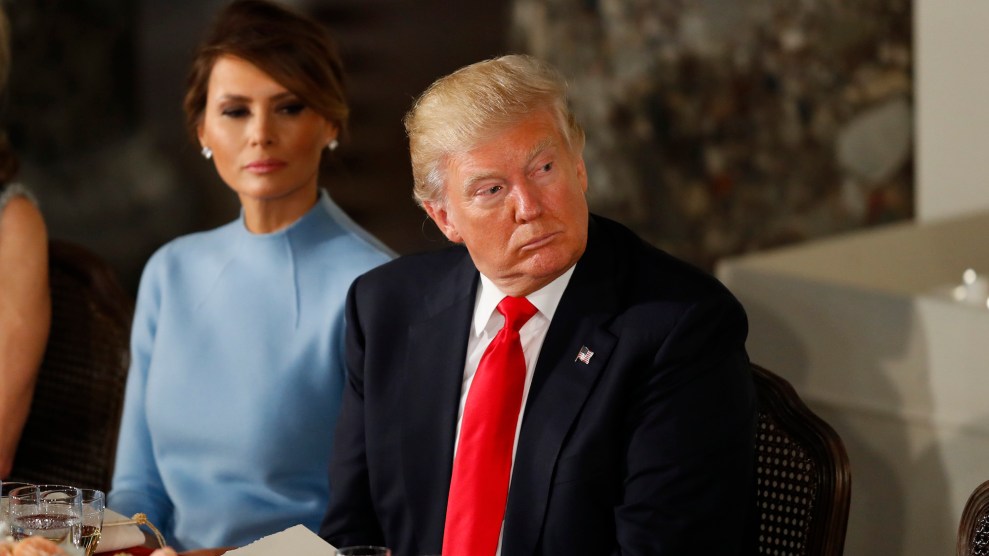On February 11, Donald Trump Jr. sat in front of his computer for a video deposition. He swore to tell the truth. But documents and a video obtained by Mother Jones—and recent legal filings—indicate that his testimony on key points was not accurate.
The matter at hand was a lawsuit filed in 2020 against Donald Trump’s inauguration committee and the Trump Organization by Karl Racine, the attorney general of Washington, DC. The suit claims that the inauguration committee misused charitable funds to enrich the Trump family. As the attorney general put it, the lawsuit “alleges that the Inaugural Committee, a nonprofit corporation, coordinated with the Trump family to grossly overpay for event space in the Trump International Hotel. Although the Inaugural Committee was aware that it was paying far above market rates, it never considered less expensive alternatives, and even paid for space on days when it did not hold events. The Committee also improperly used non-profit funds to throw a private party [at the Trump Hotel] for the Trump family costing several hundred thousand dollars.” In short, the attorney general has accused the Trump clan and its company of major grifting, and he is looking to recover the amounts paid to the Trump Hotel so he can direct those funds to real charitable purposes.
As part of the case, Racine has taken depositions from Tom Barrack, the investor and Donald Trump pal who chaired the inauguration committee; Rick Gates, the committee’s former deputy chair, who subsequently pleaded guilty to two charges stemming from special counsel Robert Mueller’s Trump-Russia investigation; and two of Trump’s adult children: Donald Jr. and Ivanka. Stephanie Winston Wolkoff, a top producer for the inauguration committee, was deposed as a lead witness cooperating with the investigation. Racine has also collected internal emails and material from the committee, its officials, and others who worked on the inauguration.
During his deposition, Trump Jr. frequently replied, “I don’t recall,” and he downplayed his involvement in preparation for his father’s inauguration in January 2017. In several exchanges, he made statements that are contradicted by documents or the recollections of others and that appear to be false.
One of the clearest instances of Trump Jr. not testifying accurately came when he was asked about Winston Wolkoff. As the lawsuit notes, during the organization of the inauguration, Winston Wolkoff, then a close friend of Melania Trump, had raised concerns with the president-elect, Ivanka Trump, and Gates about the prices the Trump Hotel was charging the inauguration committee for events to be held there. This included a written warning to Ivanka Trump and Gates that Trump’s hotel was trying to charge the committee twice the market rate for event space. (Gates ignored the warning, the lawsuit notes, and the committee struck a contract with the Trump Hotel for $1.03 million, an amount the lawsuit says was far above the hotel’s own pricing guidelines.)
During his deposition, Trump Jr. was asked about Winston Wolkoff: “Do you know her?” He replied, “I know of her. I think I’ve met her, but I don’t know her. If she was in this room I’m not sure I would recognize her.” He added, “I had no involvement with her.”
Let’s go to a videotape obtained by Mother Jones:
This footage is from a tony candlelight dinner held at Union Station in Washington, DC, the night before Trump’s inauguration. This soiree was one of the official inauguration events. (A million-dollar contribution to the inauguration committee earned a Trump donor a ticket.) Here Trump Jr. can be seen profusely praising Barrack and Winston Wolkoff for the “incredible” work they did. It seems he did know her.
And documents obtained by Mother Jones shows there’s evidence that Trump Jr.’s claim of having “no involvement” with Winston Wolkoff was false. On January 17, 2017, an assistant for Ivanka Trump texted Winston Wolkoff and said that Trump Jr. wanted to speak to her, providing Winston Wolkoff with his cell number.
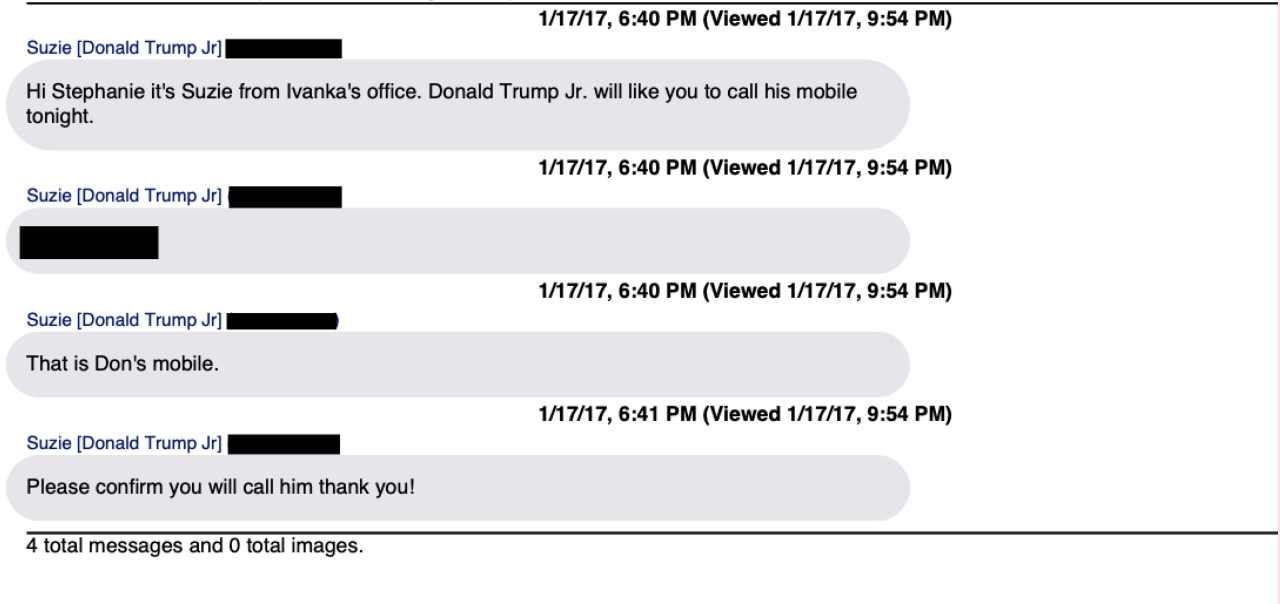
That same day, Trump Jr. emailed Winston Wolkoff and asked if they could talk. He said he had a contact who “seems to have some very big talent lined up, if we wanted it” for the inauguration events. Winston Wolkoff responded in an email, saying that the inauguration committee was “locked and loaded” for all its events. And Trump Jr. replied, “Thank you Stephanie, I wanted to see if you were still possibly looking for talent. Some friends of mine that are quite big in the industry have been asking around and would be able to put together a pretty impressive roster.”
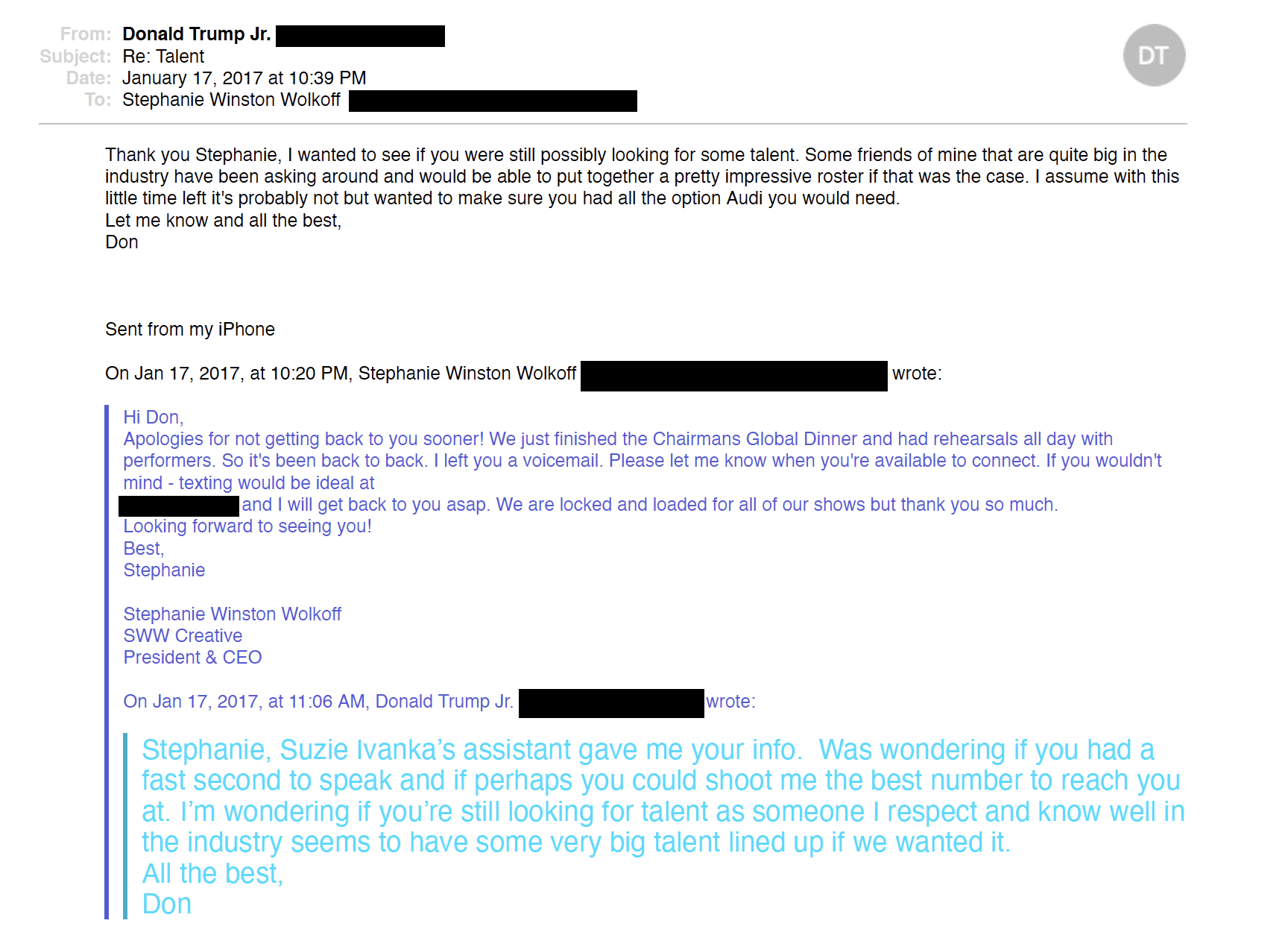
Moreover, Trump Jr. shared private moments with Winston Wolkoff during the inauguration stretch, according to Winston Wolkoff’s book Melania and Me, which chronicles her stint working for the inauguration and later for Melania on her White House staff. Two days after Trump was sworn in as president, Winston Wolkoff writes, she toured the White House with Melania (as the new first lady complained about the condition and decor of the executive mansion), and then she joined the Trumps for a celebratory dinner in the Old Family Dining Room. Around the table sat Trump, Melania, and Trump Jr. and Eric and their wives. The new president greeted Winston Wolkoff warmly and said, “Isn’t this great. Look at this!” After the dinner, she flew home to New York City with the Trump family, minus Donald, Ivanka, and Jared Kushner.
Yet Trump Jr. testified he might not recognize her.
Winston Wolkoff declined to comment on Trump Jr.’s testimony or the investigation. In a statement, she said, “I did not think it was right for the Trump Family or the Trump Family’s businesses to be financially profiting from the presidential Inauguration. It was a gross mismanagement of funds and an abuse of authority, and I made it very clear to people in the Trump Family and the inauguration committee how I felt.”
Mother Jones sent Trump Jr. and lawyers for the Trump Organization a list of questions regarding his testimony. No one responded. Mother Jones also called Trump Organization general counsel Alan Garten seeking comment, and he did not reply.
During the deposition, Trump Jr. was asked, “Did you attend an event at Union Station [during the inauguration]?” This was a reference to that fancy candlelight dinner. He replied, “I don’t know.” The video shows Trump Jr. was at this celebration, which was also attended by his father, his adult siblings, Melania, and many Trump world luminaries. In the video, Trump Jr. ebulliently proclaims that this dinner “will go down in history.” A guest list for the event prepared by the inauguration committee and obtained by Mother Jones notes that Trump Jr. had a table of his own at the function and that one of his table-mates was Wayne LaPierre, the head of the NRA.
Trump Jr. also had trouble during the deposition remembering whether on the night of the inauguration he attended that exclusive bash at the Trump Hotel that the DC attorney general says was improperly paid for by the Trump inauguration committee and describes as a “private party for the Trump children” and guests of the hotel. According to Racine, Gates, with Ivanka Trump’s knowledge, “allowed the [inauguration committee’s] nonprofit funds to pay for a private after-hours party for the Trump family at their Hotel, even after [the committee’s] staff initially canceled this event over concerns of improper use of funds. Gates allowed the event to move forward after Trump Hotel staff complained that canceling it would hurt the Hotel’s bottom line.”
Trump Jr. in his deposition told Racine’s attorneys, “I probably ended up there after, you know, a couple of those other types of balls, yes. I just don’t remember specifically. It’s a bit of a whirlwind.” The master schedule for Inauguration Day prepared by the inauguration committee for the first family shows that Trump Jr. was to be ferried to this soiree after the inauguration balls.
Regarding this particular party, Trump Jr. was asked, “There has been testimony in the record [of this case] that this event was for friends and family of the Trump children. Meaning you, Eric, Ivanka, and Tiffany. Does that sound familiar?” He replied, “No, it doesn’t.” But then he hedged a bit: “I can only say, again, we’re probably some of the only family to ever be involved in any significant fashion in a campaign of that sort. So again the relationships that we had with donors were probably rather unique. So if there was an element of exclusivity associated, okay, it’s an event for the [Trump] kids and their friends who helped the political process, I guess that’s possible. But I don’t actually recall it, you know, being dubbed that specifically.” That is, Trump was stating that this event at the hotel he-co-owned with his father, Ivanka, and Eric—financed by the nonprofit funds of the inauguration committee but not open to the public and not attended by the new president—was not really a party for him and his siblings.
But an email Gates sent to Ivanka Trump on January 11, 2017, that was obtained by Mother Jones shows that the party was indeed organized for Trump Jr., Eric, and Ivanka. “There will be an after party at the OPO [the Old Post Office, a.k.a the Trump Hotel] following the inaugural balls on Friday,” Gates wrote. “DJT is not expected to attend but was more for you, Don and Eric.”
In recently submitted legal filings in the case, Racine provides more evidence this was indeed a private affair for the Trump children and hotel guests. “Attendance was by invitation only, and guests were limited to friends and family of the President-elect and guests of the Hotel,” he maintains in one filing. And he adds, “Incredibly, the final decision to proceed with the event was not even made by the [inauguration committee], but by Donald Trump, Jr.”
A separate filing explains what happened: As of the morning of January 20, David Anderson, the director of catering at the Trump Hotel, believed this event had been canceled. But sometime that day, Tommy Hicks Jr., a close friend of Trump Jr., called Anderson and said he was with Trump Jr. and told Anderson that the event was on and that the hotel’s staff should prepare for it. Anderson subsequently received approval from his boss to proceed with the function. Anderson testified to Racine’s investigators that it was “a party for [Trump Jr.] and his selected guests.”
The inauguration committee paid the Trump Hotel $288,367 for this event, according to Racine. And the AG notes in a filing that Trump, Trump Jr., Ivanka, and Eric each profit from Trump Hotel revenues.
In his sworn testimony, Trump Jr. sidestepped the issue of whether this event was held for him and his siblings. And when he was asked if he had been “involved” in any inauguration events “like dinners, lunches, concerts,” he answered, “Not to my recollection. No.” Yet Racine’s filing places Trump Jr. in a key role related to the party that is at the center of the case against Trump’s inauguration committee and the Trump Organization.
During the planning for the inauguration, there was ongoing discussion of two other events directly connected to Donald Trump Jr. One was a ball or party to be held on the night of January 21, 2017, that was linked to a multi-day hunting trip with Trump Jr. and Eric Trump. Promotional material for this event—dubbed “Opening Day”—noted that it would be a celebration of “the great American tradition of outdoor sporting, shooting, fishing and conservation” and that for $1 million one could buy a package that included 85 VIP tickets, 200 general admission tickets, a private reception and photo op with Donald Trump, and four slots on the hunting trip. This offer made it seem the organizers of this event were peddling access to the new president and his two adult sons. Other packages ranged between $25,000 and $500,000. The promotional document claimed all net proceeds would go to conservation charities—without specifying which charities. The other inauguration-related event tied to Trump Jr. was a possible concert at the Verizon Center in Washington, DC. These two events ended up not occurring.
The investigators for the DC attorney general questioned Trump Jr. about both. His answers were arguably evasive.
Asked if he created a nonprofit called the Opening Day Foundation that was associated with the event of the same name, Trump said, “I don’t believe I did. I think, I believe others did.” And when asked whether he had been “listed as a director or an officer or CEO” of this foundation, he replied, “I don’t recall.” Did he know who the directors of that foundations were? “I don’t recall,” he replied.
Such a foundation had been established seemingly in conjunction with this proposed event. Paperwork for the Opening Day Foundation was filed on December 14, 2016, and Trump Jr. was listed as one of the four directors of the company. The other three were his brother Eric, Hicks Jr., and Gentry Beach, another close friend of Trump Jr. The registration noted Beach, a hedge fund manager, had registered the foundation at his office address. Trump Jr., though, claimed in his deposition that he couldn’t remember or was ignorant of all this. (If Beach had registered this foundation and named Trump Jr. as a director without Trump Jr.’s knowledge or permission, it did not end their close relationship. In 2017, Trump Jr. invested in a start-up being run by Beach, who was at the time also seeking support from Trump administration officials for his other business ventures.)
Racine’s lawyers posed Trump Jr. several questions about Beach and Hicks Jr., and they asked, “Did they attend other events during inauguration week [besides the inauguration ceremony] with you?” Trump Jr. answered, “I don’t know if they attended with me. I’m sure they attended other events.” In the video above, Beach is on Trump Jr.’s right, and Hicks Jr. is on Trump Jr.’s left.
Trump Jr. minimized his role in the partying-and-hunting event, telling the AG’s lawyers, “It just wasn’t a focus of mine.” But a schedule of proposed events prepared in mid-November 2016 by the inauguration committee listed a “Sportsman Ball” for the night of January 21 and noted it was a project of “Don Jr.” A similar schedule composed 10 days later also referred to a “Sportsman” event at the Trump Hotel with a private reception and stated it was an event for “Don Jr.” And a memo Winston Wolkoff sent Gates on December 10 reported, “Don Jr is hosting a Sportsman Ball on Saturday the 21st of January.” It noted, “Andrea Boccelli [sic] is a possibility.”
In mid-December 2016, TMZ broke the news that the Trump family would host a fundraiser celebrating hunters the day after the inauguration and that high-spending attendees could purchase a spot on a hunting outing with the two Trump brothers. In response to media interest in this event, famed television producer Mark Burnett, who was advising the inauguration committee, texted Winston Wolkoff: “Hunting trip with Don Jr…?? It’s nonsense. Right??” She replied, “We have NOTHING to do with this. This is GENTRY and Tommy Hicks and Don JR. I KNOW NOTHING ABOUT THIS….We have NOTHING TO DO WITH THIS AT ALL!!” Burnett told her, “Well I don’t want us…lumped in.”
During the deposition, Racine’s lawyers also queried Trump Jr. about that inauguration concert: “Were you also involved in trying to set up a separate concert?” He answered, “I don’t remember.”
Winston Wolkoff, though, remembers. In her book, she recounts that Gates hired Walter Kinzie, a friend of Trump Jr., to produce a concert at the time of the inauguration. According to Winston Wolkoff, Gates told her that the inauguration committee was handling this show, and one of Winston Wolkoff’s associates sensed something was “dodgy” about this project. In a text exchange with Winston Wolkoff, Burnett, referring to Kinzie’s hiring, observed, “Curiouser and Curiouser???? Who the F#*k is hiring these guys. How about central command????” Winston Wolkoff replied, “That is our biggest problem. Rick [Gates] is organizing these things with D. JR. and we know nothing about it.” Burnett responded, “We gotta stop this. Need central control.” A proposed schedule for inauguration events dated December 18, 2016—obtained by Mother Jones—included a “Donald Jr. Concert” on January 20 at the Verizon Center, hosted by Trump Jr. and organized by the inauguration committee.
Though neither the hunting-themed soiree nor the concert happened, Racine’s investigators were probably interested in whether nonprofit funds were properly (or not) used in the pursuit of these events. Trump Jr.’s testimony conveyed the impression that he had little to do with them.
During the deposition, Trump Jr. also indicated he had not worked with the finance committee of the inauguration effort—the fundraising arm for the project. He said he did “work trying to help out” with fundraising for the inauguration committee. But when asked if he worked “with someone who was on the financial committee,” he replied, “Not that I recall.” Sara Armstrong, who was CEO of the inauguration committee, had a different recollection. In her own deposition, she said that Trump Jr. was “loosely connected with our finance committee.” She noted that he attended “at least one” meeting of the finance committee. She added, “I don’t remember if he stayed for the duration, or if he was at all of them.”
Trump Jr. has a spotty record when it comes to telling the truth about scandals. When the news emerged in July 2017 that a year earlier he, Kushner, and Paul Manafort had secretly met in Trump Tower with a Russian emissary who they were told would supply them dirt on Hillary Clinton as part of a covert Kremlin effort to help the Trump campaign, Trump Jr. issued a statement that claimed they had gathered to discuss “a program about the adoption of Russian children.” The statement did not acknowledge that the intent of the meeting was to obtain derogatory material on Trump’s campaign rival from a Russian operative. An earlier draft of Trump Jr.’s statement did mention that the “individual” he met “might have information helpful to the campaign.” But that line was deleted at his father’s instruction, according to the final report of Mueller. (The report noted, “When the press asked questions about the President’s involvement in Trump Jr.’s statement, the President’s personal lawyer repeatedly denied the President had played any role.”)
Trump Jr.’s testimony in Congress during the Trump-Russia investigation in September 2017 also raised questions about his trustworthiness. He told the Senate Judiciary Committee that he was not “aware” of any overseas governments other than Russia offering or providing assistance to the Trump camp in 2016. Yet eight months later, the New York Times revealed that during the 2016 campaign Trump Jr. had a meeting with George Nader, an emissary for the rulers of Saudi Arabia and the United Arab Emirates; Joel Zamel, an Israeli expert in social media manipulation; and Erik Prince, the infamous private security contractor and Trump backer. (Nader is now serving a 10-year sentence on child sex trafficking and pornography charges.) “The meeting,” the newspaper reported, “was convened primarily to offer help to the Trump team.” After the Times story appeared, Sen. Chris Coons (D-Del.) declared, he was “deeply concerned that…Donald Trump Jr. provided false testimony to the Senate Judiciary Committee.”
Racine’s office declined to comment on Trump Jr.’s testimony.

